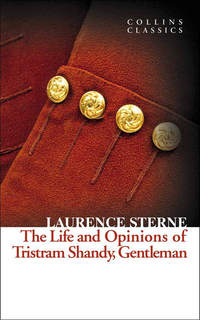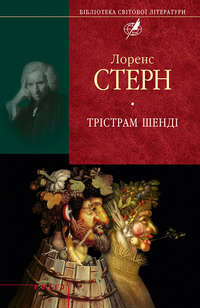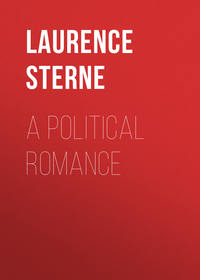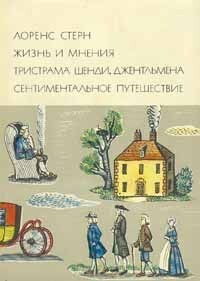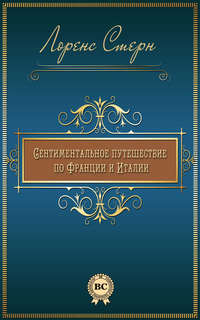
Полная версия
Tristram Shandy
Chapter Five
When a man gives himself up to the government of a ruling passion,—or, in other words, when his Hobby-Horse grows headstrong,—farewell cool reason and fair discretion!
My uncle Toby’s wound was near well, and as soon as the surgeon recovered his surprize, and could get leave to say as much—he told him, ’twas just beginning to incarnate; and that if no fresh exfoliation happened, which there was no sign of,—it would be dried up in five or six weeks. The sound of as many Olympiads, twelve hours before, would have conveyed an idea of shorter duration to my uncle Toby’s mind.—The succession of his ideas was now rapid,—he broiled with impatience to put his design in execution;—and so, without consulting farther with any soul living,—which, by the bye, I think is right, when you are predetermined to take no one soul’s advice,—he privately ordered Trim, his man, to pack up a bundle of lint and dressings, and hire a chariot-and-four to be at the door exactly by twelve o’clock that day, when he knew my father would be upon ’Change.—So leaving a bank-note upon the table for the surgeon’s care of him, and a letter of tender thanks for his brother’s—he packed up his maps, his books of fortification, his instruments, &c. and by the help of a crutch on one side, and Trim on the other,—my uncle Toby embarked for Shandy-Hall.
The reason, or rather the rise of this sudden demigration was as follows:
The table in my uncle Toby’s room, and at which, the night before this change happened, he was sitting with his maps, &c. about him—being somewhat of the smallest, for that infinity of great and small instruments of knowledge which usually lay crowded upon it—he had the accident, in reaching over for his tobacco-box, to throw down his compasses, and in stooping to take the compasses up, with his sleeve he threw down his case of instruments and snuffers;—and as the dice took a run against him, in his endeavouring to catch the snuffers in falling,—he thrust Monsieur Blondel off the table, and Count de Pagon o’top of him.
’Twas to no purpose for a man, lame as my uncle Toby was, to think of redressing these evils by himself,—he rung his bell for his man Trim;—Trim, quoth my uncle Toby, prithee see what confusion I have here been making—I must have some better contrivance, Trim.—Can’st not thou take my rule, and measure the length and breadth of this table, and then go and bespeak me one as big again?—Yes, an’ please your Honour, replied Trim, making a bow; but I hope your Honour will be soon well enough to get down to your country-seat, where,—as your Honour takes so much pleasure in fortification, we could manage this matter to a T.
I must here inform you, that this servant of my uncle Toby’s, who went by the name of Trim, had been a corporal in my uncle’s own company,—his real name was James Butler,—but having got the nick-name of Trim, in the regiment, my uncle Toby, unless when he happened to be very angry with him, would never call him by any other name.
The poor fellow had been disabled for the service, by a wound on his left knee by a musket-bullet, at the battle of Landen, which was two years before the affair of Namur;—and as the fellow was well-beloved in the regiment, and a handy fellow into the bargain, my uncle Toby took him for his servant; and of an excellent use was he, attending my uncle Toby in the camp and in his quarters as a valet, groom, barber, cook, sempster, and nurse; and indeed, from first to last, waited upon him and served him with great fidelity and affection.
My uncle Toby loved the man in return, and what attached him more to him still, was the similitude of their knowledge.—For Corporal Trim, (for so, for the future, I shall call him) by four years occasional attention to his Master’s discourse upon fortified towns, and the advantage of prying and peeping continually into his Master’s plans, &c. exclusive and besides what he gained Hobby-Horsically, as a body-servant, Non Hobby Horsical per se;—had become no mean proficient in the science; and was thought, by the cook and chamber-maid, to know as much of the nature of strong-holds as my uncle Toby himself.
I have but one more stroke to give to finish Corporal Trim’s character,—and it is the only dark line in it.—The fellow loved to advise,—or rather to hear himself talk; his carriage, however, was so perfectly respectful, ’twas easy to keep him silent when you had him so; but set his tongue a-going,—you had no hold of him—he was voluble;—the eternal interlardings of your Honour, with the respectfulness of Corporal Trim’s manner, interceding so strong in behalf of his elocution,—that though you might have been incommoded,—you could not well be angry. My uncle Toby was seldom either the one or the other with him,—or, at least, this fault, in Trim, broke no squares with them. My uncle Toby, as I said, loved the man;—and besides, as he ever looked upon a faithful servant,—but as an humble friend,—he could not bear to stop his mouth.—Such was Corporal Trim.
If I durst presume, continued Trim, to give your Honour my advice, and speak my opinion in this matter.—Thou art welcome, Trim, quoth my uncle Toby—speak,—speak what thou thinkest upon the subject, man, without fear.—Why then, replied Trim, (not hanging his ears and scratching his head like a country-lout, but) stroking his hair back from his forehead, and standing erect as before his division,—I think, quoth Trim, advancing his left, which was his lame leg, a little forwards,—and pointing with his right hand open towards a map of Dunkirk, which was pinned against the hangings,—I think, quoth Corporal Trim, with humble submission to your Honour’s better judgment,—that these ravelins, bastions, curtins, and hornworks, make but a poor, contemptible, fiddle-faddle piece of work of it here upon paper, compared to what your Honour and I could make of it were we in the country by ourselves, and had but a rood, or a rood and a half of ground to do what we pleased with: As summer is coming on, continued Trim, your Honour might sit out of doors, and give me the nography—(Call it ichnography, quoth my uncle,)—of the town or citadel, your Honour was pleased to sit down before,—and I will be shot by your Honour upon the glacis of it, if I did not fortify it to your Honour’s mind.—I dare say thou would’st, Trim, quoth my uncle.—For if your Honour, continued the Corporal, could but mark me the polygon, with its exact lines and angles—That I could do very well, quoth my uncle.—I would begin with the fosse, and if your Honour could tell me the proper depth and breadth—I can to a hair’s breadth, Trim, replied my uncle.—I would throw out the earth upon this hand towards the town for the scarp,—and on that hand towards the campaign for the counterscarp.—Very right, Trim, quoth my uncle Toby:—And when I had sloped them to your mind,—an’ please your Honour, I would face the glacis, as the finest fortifications are done in Flanders, with sods,—and as your Honour knows they should be,—and I would make the walls and parapets with sods too.—The best engineers call them gazons, Trim, said my uncle Toby.—Whether they are gazons or sods, is not much matter, replied Trim; your Honour knows they are ten times beyond a facing either of brick or stone.—I know they are, Trim in some respects,—quoth my uncle Toby, nodding his head;—for a cannon-ball enters into the gazon right onwards, without bringing any rubbish down with it, which might fill the fosse, (as was the case at St. Nicolas’s gate) and facilitate the passage over it.
Your Honour understands these matters, replied Corporal Trim, better than any officer in his Majesty’s service;—but would your Honour please to let the bespeaking of the table alone, and let us but go into the country, I would work under your Honour’s directions like a horse, and make fortifications for you something like a tansy, with all their batteries, saps, ditches, and palisadoes, that it should be worth all the world’s riding twenty miles to go and see it.
My uncle Toby blushed as red as scarlet as Trim went on;—but it was not a blush of guilt,—of modesty,—or of anger,—it was a blush of joy;—he was fired with Corporal Trim’s project and description.—Trim! said my uncle Toby, thou hast said enough.—We might begin the campaign, continued Trim, on the very day that his Majesty and the Allies take the field, and demolish them town by town as fast as—Trim, quoth my uncle Toby, say no more. Your Honour, continued Trim, might sit in your arm-chair (pointing to it) this fine weather, giving me your orders, and I would—Say no more, Trim, quoth my uncle Toby—Besides, your Honour would get not only pleasure and good pastime—but good air, and good exercise, and good health,—and your Honour’s wound would be well in a month. Thou hast said enough, Trim,—quoth my uncle Toby (putting his hand into his breeches-pocket)—I like thy project mightily.—And if your Honour pleases, I’ll this moment go and buy a pioneer’s spade to take down with us, and I’ll bespeak a shovel and a pick-axe, and a couple of—Say no more, Trim, quoth my uncle Toby, leaping up upon one leg, quite overcome with rapture,—and thrusting a guinea into Trim’s hand,—Trim, said my uncle Toby, say no more;—but go down, Trim, this moment, my lad, and bring up my supper this instant.
Trim ran down and brought up his master’s supper,—to no purpose:—Trim’s plan of operation ran so in my uncle Toby’s head, he could not taste it.—Trim, quoth my uncle Toby, get me to bed.—’Twas all one.—Corporal Trim’s description had fired his imagination,—my uncle Toby could not shut his eyes.—The more he considered it, the more bewitching the scene appeared to him;—so that, two full hours before day-light, he had come to a final determination and had concerted the whole plan of his and Corporal Trim’s decampment.
My uncle Toby had a little neat country-house of his own, in the village where my father’s estate lay at Shandy, which had been left him by an old uncle, with a small estate of about one hundred pounds a-year. Behind this house, and contiguous to it, was a kitchen-garden of about half an acre, and at the bottom of the garden, and cut off from it by a tall yew hedge, was a bowling-green, containing just about as much ground as Corporal Trim wished for;—so that as Trim uttered the words, ‘A rood and a half of ground to do what they would with,’—this identical bowling-green instantly presented itself, and became curiously painted all at once, upon the retina of my uncle Toby’s fancy;—which was the physical cause of making him change colour, or at least of heightening his blush, to that immoderate degree I spoke of.
Never did lover post down to a beloved mistress with more heat and expectation, than my uncle Toby did, to enjoy this self-same thing in private;—I say in private;—for it was sheltered from the house, as I told you, by a tall yew hedge, and was covered on the other three sides, from mortal sight, by rough holly and thick-set flowering shrubs:—so that the idea of not being seen, did not a little contribute to the idea of pleasure pre-conceived in my uncle Toby’s mind.—Vain thought! however thick it was planted about,—or private soever it might seem,—to think, dear uncle Toby, of enjoying a thing which took up a whole rood and a half of ground,—and not have it known!
How my uncle Toby and Corporal Trim managed this matter,—with the history of their campaigns, which were no way barren of events,—may make no uninteresting under-plot in the epitasis and working-up of this drama.—At present the scene must drop,—and change for the parlour fire-side.
Chapter Six
—What can they be doing? brother, said my father.—I think, replied my uncle Toby,—taking, as I told you, his pipe from his mouth, and striking the ashes out of it as he began his sentence;—I think, replied he,—it would not be amiss, brother, if we rung the bell.
Pray, what’s all that racket over our heads, Obadiah?—quoth my father;—my brother and I can scarce hear ourselves speak.
Sir, answered Obadiah, making a bow towards his left shoulder,—my Mistress is taken very badly.—And where’s Susannah running down the garden there, as if they were going to ravish her?—Sir, she is running the shortest cut into the town, replied Obadiah, to fetch the old midwife.—Then saddle a horse, quoth my father, and do you go directly for Dr. Slop, the man-midwife, with all our services,—and let him know your mistress is fallen into labour—and that I desire he will return with you with all speed.
It is very strange, says my father, addressing himself to my uncle Toby, as Obadiah shut the door,—as there is so expert an operator as Dr. Slop so near,—that my wife should persist to the very last in this obstinate humour of hers, in trusting the life of my child, who has had one misfortune already, to the ignorance of an old woman;—and not only the life of my child, brother,—but her own life, and with it the lives of all the children I might, peradventure, have begot out of her hereafter.
Mayhap, brother, replied my uncle Toby, my sister does it to save the expence:—A pudding’s end,—replied my father,—the Doctor must be paid the same for inaction as action,—if not better,—to keep him in temper.
—Then it can be out of nothing in the whole world, quoth my uncle Toby, in the simplicity of his heart,—but Modesty.—My sister, I dare say, added he, does not care to let a man come so near her … I will not say whether my uncle Toby had completed the sentence or not;—’tis for his advantage to suppose he had,—as, I think, he could have added no One Word which would have improved it.
If, on the contrary, my uncle Toby had not fully arrived at the period’s end—then the world stands indebted to the sudden snapping of my father’s tobacco-pipe for one of the neatest examples of that ornamental figure in oratory, which Rhetoricians stile the Aposiopesis.—Just Heaven! how does the Poco piu and the Poco meno of the Italian artists;—the insensible more or less, determine the precise line of beauty in the sentence, as well as in the statue! How do the slight touches of the chisel, the pencil, the pen, the fiddle-stick, et caetera,—give the true swell, which gives the true pleasure!—O my countrymen:—be nice; be cautious of your language; and never, O! never let it be forgotten upon what small particles your eloquence and your fame depend.
—‘My sister, mayhap,’ quoth my uncle Toby, ‘does not choose to let a man come so near her …’ Make this dash,—’tis an Aposiopesis,—Take the dash away, and write Backside,—’tis Bawdy.—Scratch Backside out, and put Cover’d way in, ’tis a Metaphor;—and, I dare say, as fortification ran so much in my uncle Toby’s head, that if he had been left to have added one word to the sentence,—that word was it.
But whether that was the case or not the case;—or whether the snapping of my father’s tobacco-pipe, so critically, happened through accident or anger, will be seen in due time.
Chapter Seven
Tho’ my father was a good natural philosopher,—yet he was something of a moral philosopher too; for which reason, when his tobacco-pipe snapp’d short in the middle,—he had nothing to do, as such, but to have taken hold of the two pieces, and thrown them gently upon the back of the fire.—He did no such thing;—he threw them with all the violence in the world;—and, to give the action still more emphasis,—he started upon both his legs to do it.
This looked something like heat;—and the manner of his reply to what my uncle Toby was saying, proved it was so.
—‘Not choose,’ quoth my father, (repeating my uncle Toby’s words) ‘to let a man come so near her!’—By Heaven, brother Toby! you would try the patience of Job;—and I think I have the plagues of one already without it.—Why?—Where?—Wherein?—Wherefore?—Upon what account? replied my uncle Toby: in the utmost astonishment.—To think, said my father, of a man living to your age, brother, and knowing so little about women!—I know nothing at all about them,—replied my uncle Toby: And I think, continued he, that the shock I received the year after the demolition of Dunkirk, in my affair with widow Wadman;—which shock you know I should not have received, but from my total ignorance of the sex,—has given me just cause to say, That I neither know nor do pretend to know any thing about ’em or their concerns either.—Methinks, brother, replied my father, you might, at least, know so much as the right end of a woman from the wrong.
It is said in Aristotle’s Master Piece, ‘That when a man doth think of any thing which is past,—he looketh down upon the ground;—but that when he thinketh of something that is to come, he looketh up towards the heavens.’
My uncle Toby, I suppose, thought of neither, for he look’d horizontally.—Right end! quoth my uncle Toby, muttering the two words low to himself, and fixing his two eyes insensibly as he muttered them, upon a small crevice, formed by a bad joint in the chimney-piece—Right end of a woman!—I declare, quoth my uncle, I know no more which it is than the man in the moon;—and if I was to think, continued my uncle Toby (keeping his eyes still fixed upon the bad joint) this month together, I am sure I should not be able to find it out.
Then, brother Toby, replied my father, I will tell you.
Every thing in this world, continued my father (filling a fresh pipe)—every thing in this world, my dear brother Toby, has two handles.—Not always, quoth my uncle Toby.—At least, replied my father, every one has two hands,—which comes to the same thing.—Now, if a man was to sit down coolly, and consider within himself the make, the shape, the construction, come-at-ability, and convenience of all the parts which constitute the whole of that animal, called Woman, and compare them analogically—I never understood rightly the meaning of that word,—quoth my uncle Toby.—
Analogy, replied my father, is the certain relation and agreement which different—Here a devil of a rap at the door snapped my father’s definition (like his tobacco-pipe) in two,—and, at the same time, crushed the head of as notable and curious a dissertation as ever was engendered in the womb of speculation;—it was some months before my father could get an opportunity to be safely delivered of it:—And, at this hour, it is a thing full as problematical as the subject of the dissertation itself,—(considering the confusion and distresses of our domestick misadventures, which are now coming thick one upon the back of another) whether I shall be able to find a place for it in the third volume or not.
Chapter Eight
It is about an hour and a half’s tolerable good reading since my uncle Toby rung the bell, when Obadiah was ordered to saddle a horse, and go for Dr. Slop, the man-midwife;—so that no one can say, with reason, that I have not allowed Obadiah time enough, poetically speaking, and considering the emergency too, both to go and come;—though, morally and truly speaking, the man perhaps has scarce had time to get on his boots.
If the hypercritick will go upon this; and is resolved after all to take a pendulum, and measure the true distance betwixt the ringing of the bell, and the rap at the door;—and, after finding it to be no more than two minutes, thirteen seconds, and three-fifths,—should take upon him to insult over me for such a breach in the unity, or rather probability of time;—I would remind him, that the idea of duration, and of its simple modes, is got merely from the train and succession of our ideas—and is the true scholastic pendulum,—and by which, as a scholar, I will be tried in this matter,—abjuring and detesting the jurisdiction of all other pendulums whatever.
I would therefore desire him to consider that it is but poor eight miles from Shandy-Hall to Dr. Slop, the man-midwife’s house:—and that whilst Obadiah has been going those said miles and back, I have brought my uncle Toby from Namur, quite across all Flanders, into England:—That I have had him ill upon my hands near four years;—and have since travelled him and Corporal Trim in a chariot-and-four, a journey of near two hundred miles down into Yorkshire.—all which put together, must have prepared the reader’s imagination for the entrance of Dr. Slop upon the stage,—as much, at least (I hope) as a dance, a song, or a concerto between the acts.
If my hypercritick is intractable, alledging, that two minutes and thirteen seconds are no more than two minutes and thirteen seconds,—when I have said all I can about them; and that this plea, though it might save me dramatically, will damn me biographically, rendering my book from this very moment, a professed Romance, which, before, was a book apocryphal:—If I am thus pressed—I then put an end to the whole objection and controversy about it all at once,—by acquainting him, that Obadiah had not got above threescore yards from the stable-yard, before he met with Dr. Slop;—and indeed he gave a dirty proof that he had met with him, and was within an ace of giving a tragical one too.
Imagine to yourself;—but this had better begin a new chapter.
Chapter Nine
Imagine to yourself a little squat, uncourtly figure of a Doctor Slop, of about four feet and a half perpendicular height, with a breadth of back, and a sesquipedality of belly, which might have done honour to a serjeant in the horse-guards.
Such were the out-lines of Dr. Slop’s figure, which—if you have read Hogarth’s analysis of beauty, and if you have not, I wish you would;—you must know, may as certainly be caricatured, and conveyed to the mind by three strokes as three hundred.
Imagine such a one,—for such, I say, were the outlines of Dr. Slop’s figure, coming slowly along, foot by foot, waddling thro’ the dirt upon the vertebrae of a little diminutive pony, of a pretty colour—but of strength,—alack!—scarce able to have made an amble of it, under such a fardel, had the roads been in an ambling condition.—They were not.—Imagine to yourself, Obadiah mounted upon a strong monster of a coach-horse, pricked into a full gallop, and making all practicable speed the adverse way.
Pray, Sir, let me interest you a moment in this description.
Had Dr. Slop beheld Obadiah a mile off, posting in a narrow lane directly towards him, at that monstrous rate,—splashing and plunging like a devil thro’ thick and thin, as he approached, would not such a phaenomenon, with such a vortex of mud and water moving along with it, round its axis,—have been a subject of juster apprehension to Dr. Slop in his situation, than the worst of Whiston’s comets?—To say nothing of the Nucleus; that is, of Obadiah and the coach-horse.—In my idea, the vortex alone of ’em was enough to have involved and carried, if not the doctor, at least the doctor’s pony, quite away with it. What then do you think must the terror and hydrophobia of Dr. Slop have been, when you read (which you are just going to do) that he was advancing thus warily along towards Shandy-Hall, and had approached to within sixty yards of it, and within five yards of a sudden turn, made by an acute angle of the garden-wall,—and in the dirtiest part of a dirty lane,—when Obadiah and his coach-horse turned the corner, rapid, furious,—pop,—full upon him!—Nothing, I think, in nature, can be supposed more terrible than such a rencounter,—so imprompt! so ill prepared to stand the shock of it as Dr. Slop was.
What could Dr. Slop do?—he crossed himself +—Pugh!—but the doctor, Sir, was a Papist.—No matter; he had better have kept hold of the pummel.—He had so;—nay, as it happened, he had better have done nothing at all; for in crossing himself he let go his whip,—and in attempting to save his whip betwixt his knee and his saddle’s skirt, as it slipped, he lost his stirrup,—in losing which he lost his seat;—and in the multitude of all these losses (which, by the bye, shews what little advantage there is in crossing) the unfortunate doctor lost his presence of mind. So that without waiting for Obadiah’s onset, he left his pony to its destiny, tumbling off it diagonally, something in the stile and manner of a pack of wool, and without any other consequence from the fall, save that of being left (as it would have been) with the broadest part of him sunk about twelve inches deep in the mire.
Obadiah pull’d off his cap twice to Dr. Slop;—once as he was falling,—and then again when he saw him seated.—Ill-timed complaisance;—had not the fellow better have stopped his horse, and got off and help’d him?—Sir, he did all that his situation would allow;—but the Momentum of the coach-horse was so great, that Obadiah could not do it all at once; he rode in a circle three times round Dr. Slop, before he could fully accomplish it any how;—and at the last, when he did stop his beast, ’twas done with such an explosion of mud, that Obadiah had better have been a league off. In short, never was a Dr. Slop so beluted, and so transubstantiated, since that affair came into fashion.


